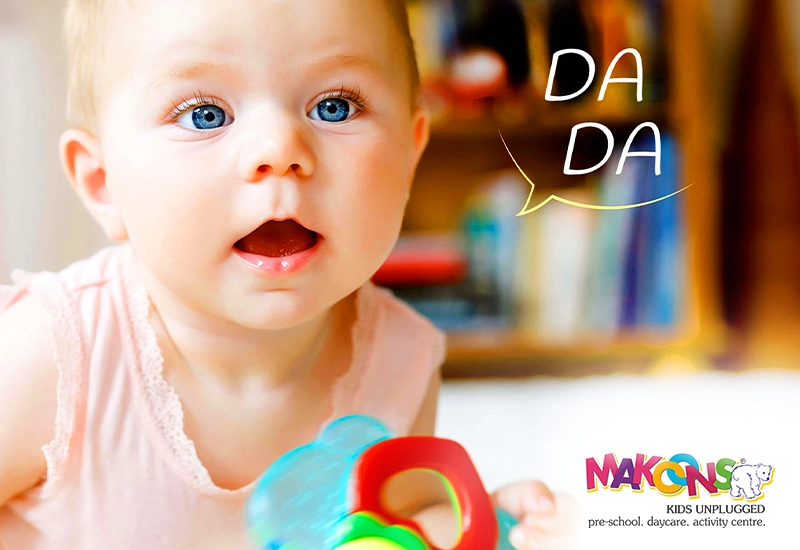Seeing a child grow makes one very happy. Among the numerous amazing achievements, a baby’s first words stand out as a very treasured event for their parents. Knowing baby language development can enable you to know what to expect and how to assist in the communication path of your child.
Understanding Baby Communication Timeline
Every baby is different and communicates differently. While some infants may pronounce their first identifiable words at about ten months, others may take until fourteen months or beyond. This is quite usual! The secret is realizing that communication starts long before specific words ever show up.
Early Baby Speech Milestones: 0-3 Months
Your infant is already setting the groundwork for future speech during the first three months. These early baby talking stages entail the following:
Crying and Cooing (0-2 months): Crying is the first way your newborn expresses herself. Different screams signal different things: hunger, weariness, or discomfort. At around six to eight weeks, babies typically begin to make those delightful cooing noises.
Social Smiling and Gurgling (2-3 months): Your infant starts to grin in reaction to your face and voice. They might even try to “talk back” when you speak to them and start producing gurgling sounds. Development of a baby’s language depends critically on this back-and-forth connection.
Building Blocks: 3-6 Months
During this stage, your baby will significantly improve their communication skills.
Babbling Begins (4-6 months): Your child begins playing with vowel and consonant sounds. Though they lack significance yet, you will hear combinations like “ba-ba” or “ma-ma.” Future speaking depends on this random babble as a necessary exercise.
Responding to Sounds: Your infant starts to pay attention to various sounds and might turn their head toward known speakers. They are learning to separate speech’s many tones and moods.
The Exciting Phase: 6-9 Months
During these months, baby speech milestones become more noticeable:
Meaningful Babbling (6-8 months): The babble turns from random to deliberate. Your infant may copy syllables such as “Ta-Ta-Ta” or “ra-ra-ra.” They are grasping language’s flow and rhythm.
Understanding Simple Words (8-9 months): Before developing language, babies start grasping simple words like “outside,” “bye,” and their names. Even though they cannot speak clearly, their comprehension is evident in their reactions. For instance, hearing “bye-bye” could prompt them to wave, or being called “mumma” or “paa” might make them turn their heads.
First Words Era: 9-12 Months
This is when many parents wonder when their baby will start talking:
First True Words (10-12 months): First True Words (10–12 months) Between the ages of 10 and 14 months, a majority of infants speak their first recognizable word. These are purposefully used words with real significance.
Gesture Communication: Your baby may mix motions with sounds and start pointing at objects they like. They know much more than they can say.
Expanding Vocabulary: 12-18 Months
Baby talking stages accelerate during this period:
Vocabulary Growth (12-15 months): Usually, after the first word, vocabulary increases gradually at first. Every month, your child could pick up two to three new words. They utter less than they understand—many more words.
Word Combinations Begin (15-18 months): Some babies start combining two words, like “more milk” or “bye dada.” This shows advancing baby language development and understanding of how words work together.
Conversation Starters: 18-24 Months
The second year brings exciting developments:
Vocabulary Explosion (18-20 months) Many toddlers have a “word explosion,” in which they pick up new words, sometimes many every day, fast. Their vocabulary may range in terms from 50 to 100.
Simple Sentences (20-24 months) Two-word phrases become more common and meaningful. Your toddler might say “want cookie” or “go outside.” They’re learning basic grammar rules.
Supporting Your Baby’s Communication Journey
Simple milestones to help your baby learn to talk include:
Talk Constantly: Tell about your daily activities. “Let’s make breakfast together,” or “Now we’re changing your diaper.” One finds great value in this ongoing linguistic immersion.
Read Together Daily: Even to small children, reading books exposes them to language patterns, vocabulary, and speech rhythm. Use sound effects and picture pointing to make it interactive.
Respond to All Communication: React as though you were having a real conversation, whether your infant gestures, babbles, or cries. This helps children to see that communication is two-way.
Sing Songs and Nursery Rhymes: Babies can understand language patterns utilizing music and rhythm. Baby language development benefits from simple tunes with repeating lyrics.
Creating the Perfect Environment for Speech
Your home environment plays a huge role in supporting your baby’s language development. This is how to design a speech-friendly environment:
Limit Background Noise: During play and chats, turn off the TV. When a baby can concentrate on your speech free from competing sounds, they learn more.
Face-to-Face Time: In talks, approach your infant at her level. Crucially for their learning, eye contact allows them to watch how your mouth moves to produce various sounds.
Use Real Words: Although baby babble is natural and good, also utilize actual language. Instead of merely “doggy,” say “Look at the big brown dog!” Their language naturally develops from this.
Also Read – When to Worry: Warning Signs in Newborn Behavior and Appearance
The Beautiful Journey Ahead
Knowing the chronology of baby communication helps one to create reasonable expectations and celebrate every little success. Every coo, babble, and first word captures your baby’s incredible path toward communicatorial development.
Your consistency, love, and patience will be the most valuable gifts you could provide your developing talker. Not too far off, your tiny chatterbox will wow you with her chats!
When it comes to when they start to talk, every child follows a distinct road; but, your baby will find their voice in their precise moment with your help and encouragement.


